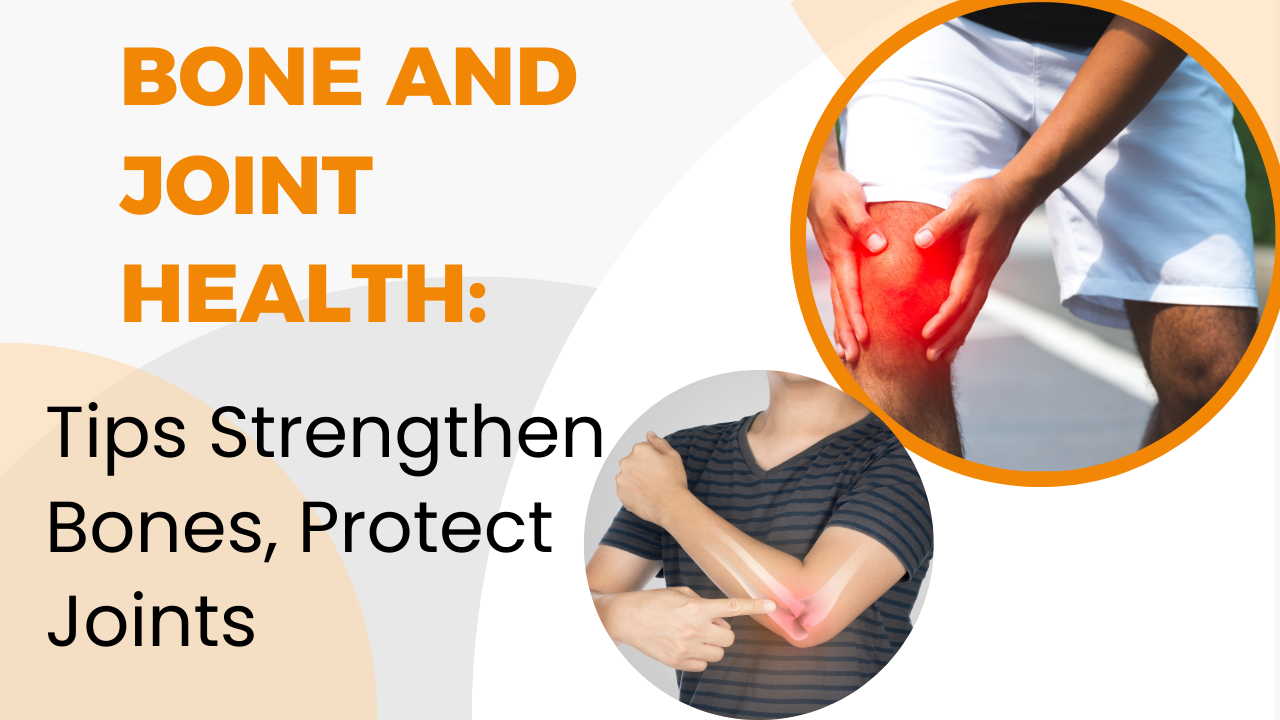Bone and joint health plays a vital role in maintaining overall strength, stability, and mobility throughout life. Our bones serve as the framework of the body, while joints enable smooth and pain-free movement. Ignoring bone and joint health can lead to issues like arthritis, osteoporosis, stiffness, or fractures, which affect the quality of life.
Maintaining bone and joint health requires a holistic approach that includes proper nutrition, exercise, and lifestyle adjustments. A strong skeletal system supports daily activities, while healthy joints prevent discomfort and mobility limitations. This is why focusing on preventive care is essential, especially as we age.
In today’s fast-paced lifestyle, factors like poor diet, lack of exercise, and stress can impact bone and joint health negatively. However, with simple yet effective changes, anyone can strengthen their bones, protect their joints, and enjoy lasting mobility. Let’s explore the top 8 tips for optimal bone and joint health.

What is Bone and Joint Health ?
Bone and joint health refers to the strength, flexibility, and functionality of your skeletal system and the connective tissues that support movement. Bones act as the body’s framework, while joints allow flexibility and range of motion. Good bone and joint health ensures that you can move freely, maintain balance, and perform daily tasks with ease.
Strong bones and healthy joints are crucial for overall physical resilience. They protect internal organs, store essential minerals, and work in coordination with muscles to provide mobility. Without proper care, bone density can decline, and joints may become stiff or inflamed, leading to conditions like arthritis or osteoporosis.
Focusing on bone and joint health from an early stage helps maintain mobility throughout life. Through proper nutrition, exercise, hydration, and lifestyle habits, you can preserve your skeletal strength and protect your body against age-related decline.
How Does Bone and Joint Health Work ?
Bone and joint health works through the balance of nutrition, activity, and biological processes that keep your skeletal system strong and functional. Bones are living tissues that constantly remodel themselves, and joints act as hinges, cushioned by cartilage and lubricated by synovial fluid. Together, they enable smooth and pain-free movement.
Healthy bones require adequate intake of calcium, vitamin D, and protein, while joints need hydration and anti-inflammatory nutrients to remain supple. Regular weight-bearing exercise helps bones grow stronger, and stretching or yoga improves flexibility and reduces joint stiffness. Lifestyle choices such as avoiding smoking and excessive alcohol also play a role.
When bone and joint health is maintained, you experience fewer aches, reduced risk of fractures, and better posture. This balance ensures long-term resilience, allowing you to remain active, independent, and strong as you age.
When Should You Focus on Bone and Joint Health ?
Bone and joint health should be a lifelong priority, starting from childhood and continuing into old age. During childhood and adolescence, bones are still developing, making it crucial to consume calcium-rich foods, stay active, and build bone mass for the future.
In adulthood, maintaining bone and joint health means focusing on lifestyle habits that prevent early wear and tear. Regular exercise, posture correction, and stress management reduce joint stress, while balanced nutrition supports bone density. This is also the stage when preventive care becomes important to avoid future complications.
As you age, bone density naturally decreases, and joints become more prone to stiffness and inflammation. Prioritizing bone and joint health during this phase ensures mobility, independence, and protection against fractures. No matter your age, it’s never too late to start taking care of your skeletal system for long-term well-being.
Where Does Bone and Joint Health Matter Most ?
Bone and joint health matters in every aspect of life, from daily routines to physical activities. At home, healthy bones and joints allow you to perform simple tasks like walking, bending, or carrying groceries without pain or discomfort. They are the foundation of independence in everyday living.
In professional and fitness environments, bone and joint health becomes even more significant. Whether you’re sitting at a desk, standing for long hours, or engaging in sports, your skeletal system supports your movements. Poor health in this area can lead to injuries, reduced productivity, and chronic pain.
Beyond work and exercise, bone and joint health matters in long-term aging and quality of life. It determines your ability to stay active, travel, and enjoy hobbies. Wherever mobility and flexibility are required, strong bones and healthy joints make the difference between limitation and freedom.
Why is Bone and Joint Health Important ?
Bone and joint health is important because it forms the basis of mobility, strength, and overall quality of life. Without strong bones and flexible joints, daily activities become challenging, and the risk of injury or chronic conditions increases significantly.
Maintaining bone and joint health helps prevent osteoporosis, arthritis, and mobility issues. It ensures your body remains resilient, supports proper posture, and reduces the likelihood of fractures. Healthy joints also allow smoother, pain-free movement, improving both comfort and performance in daily life.
The importance of bone and joint health extends to mental and emotional well-being. When your body moves easily, you feel more confident, active, and independent. Taking care of your skeletal system through exercise, diet, and stress management ensures long-lasting vitality, making it a cornerstone of healthy living.
Top Tips
Maintain a Balanced Diet for Bone and Joint Health

A nutritious diet is the foundation of strong bones and flexible joints. Foods rich in calcium, magnesium, vitamin D, and protein play a crucial role in maintaining bone density and cartilage health. Incorporating dairy products, leafy greens, nuts, seeds, and fish supports bone and joint health naturally.
Vitamin D helps the body absorb calcium effectively, while omega-3 fatty acids found in fish and flaxseeds reduce inflammation in joints. Protein strengthens muscles that protect bones and joints from excessive strain. By prioritizing these nutrients, you can enhance long-term bone and joint health.
Avoid processed foods, sugary snacks, and excessive caffeine, as they may deplete calcium levels. Instead, focus on whole foods, fresh fruits, and hydration. A balanced diet not only fuels the body but also ensures your skeletal system stays resilient and joints remain flexible, preventing discomfort and stiffness.
Engage in Regular Weight-Bearing Exercise
Physical activity is essential for bone and joint health, and weight-bearing exercises are particularly beneficial. Activities like walking, jogging, hiking, and strength training help stimulate bone growth and strengthen supporting muscles. This reduces the risk of fractures and joint injuries.
Regular exercise improves flexibility, joint lubrication, and overall mobility. Strength training, in particular, enhances bone density while improving posture and stability. By engaging in weight-bearing workouts at least three times a week, you promote long-term bone and joint health.
Low-impact exercises like yoga, swimming, or cycling are also excellent for joint health, especially for individuals with arthritis or stiffness. Consistency matters more than intensity, so choosing enjoyable activities ensures sustainability. Exercise doesn’t just protect bone and joint health — it boosts energy, enhances mood, and contributes to overall well-being.
Maintain a Healthy Weight to Reduce Joint Stress
Carrying excess weight puts additional pressure on the joints, especially the knees, hips, and spine. This can accelerate wear and tear, leading to joint pain, stiffness, and conditions like osteoarthritis. Maintaining a healthy weight is one of the best ways to protect bone and joint health.
Even modest weight loss can significantly reduce joint strain. A healthy weight decreases inflammation in the body, improves mobility, and supports bone density. Combining proper nutrition with regular exercise creates a sustainable path to improved bone and joint health.
Focusing on portion control, mindful eating, and avoiding excessive sugar or unhealthy fats helps with weight management. By keeping your body at a healthy weight, you not only protect your joints but also enhance your overall quality of life, ensuring greater mobility and independence as you age.
Prioritize Proper Posture and Ergonomics
Posture plays a vital role in protecting both bones and joints. Poor posture places uneven stress on the spine, hips, and knees, leading to discomfort, misalignment, and long-term damage. Prioritizing good posture is key to maintaining bone and joint health.
Ergonomic furniture and proper workstation setups reduce strain during daily activities. Simple adjustments like keeping screens at eye level, using supportive chairs, and practicing correct lifting techniques can make a big difference. These practices help reduce pressure on joints and maintain spinal health.
Incorporating posture-correcting exercises, stretching, and core strengthening activities also supports alignment. Good posture not only protects bones and joints but also boosts energy, prevents fatigue, and enhances overall confidence. Making conscious ergonomic choices ensures long-lasting benefits for bone and joint health.
Stay Hydrated for Joint Lubrication
Hydration is often overlooked, but it’s essential for bone and joint health. Water helps maintain the lubrication of joints by supporting the production of synovial fluid, which prevents friction between bones. Dehydration can lead to stiffness, discomfort, and reduced mobility.
Staying hydrated ensures that cartilage remains cushioned and joints function smoothly. Along with water, hydrating foods like cucumbers, melons, and citrus fruits can contribute to overall hydration and promote bone and joint health.
Developing a habit of drinking 8–10 glasses of water daily benefits not only your joints but also your overall wellness. Hydration improves flexibility, reduces inflammation, and supports bone mineralization. By making hydration a daily priority, you strengthen the foundation of bone and joint health naturally.
Incorporate Bone-Supporting Supplements
In some cases, diet alone may not provide sufficient nutrients for optimal bone and joint health. Supplements like calcium, vitamin D, magnesium, glucosamine, and chondroitin can help fill nutritional gaps and support mobility.
Calcium and vitamin D are crucial for bone density, while glucosamine and chondroitin help maintain cartilage structure and reduce joint pain. These supplements, when taken under medical guidance, enhance bone and joint health effectively.
However, supplements should complement a balanced diet and healthy lifestyle, not replace them. Consulting a healthcare provider ensures proper dosage and prevents side effects. With the right supplementation, you can safeguard your skeletal system and improve joint comfort, leading to long-term mobility and strength.
Manage Stress for Stronger Bones and Joints

Chronic stress affects not only mental well-being but also bone and joint health. High stress levels can increase inflammation, disrupt hormonal balance, and weaken bone density over time. Learning to manage stress is crucial for maintaining overall skeletal strength.
Relaxation techniques like meditation, yoga, deep breathing, and mindfulness reduce stress and support bone and joint health. These practices also promote better sleep, which is essential for recovery and repair. Stress management enhances both physical and mental resilience.
Making time for hobbies, social interactions, and adequate rest helps reduce tension and improves quality of life. By keeping stress under control, you protect your joints from unnecessary inflammation and ensure your bones remain strong and healthy throughout life.
Get Regular Check-Ups and Screenings
Preventive healthcare is key to long-term bone and joint health. Regular check-ups, bone density scans, and screenings for conditions like arthritis or osteoporosis help identify issues early and prevent complications.
Healthcare providers can recommend personalized strategies, lifestyle changes, or supplements to strengthen bones and joints. Monitoring vitamin D, calcium, and hormone levels also ensures proactive bone and joint health management.
By taking preventive measures, you reduce the risk of fractures, joint deterioration, and age-related conditions. Early detection empowers you to make informed decisions about your health. Regular medical guidance ensures your bone and joint health remains strong and resilient, supporting lifelong mobility.
🦴 Bone and Joint Health: A Complete Guide
✅ Eat a Nutrient-Rich Diet

Bone and joint health starts with the right nutrition. Your bones need calcium, vitamin D, magnesium, and phosphorus to stay strong. Without these nutrients, bones weaken over time, leading to conditions like osteoporosis. Eating dairy products, leafy greens, seeds, nuts, and fortified foods helps build resilience.
For joints, nutrients like omega-3 fatty acids and antioxidants reduce inflammation and keep them lubricated. Foods such as salmon, flaxseeds, walnuts, and berries protect cartilage and reduce stiffness. A diet low in processed food and sugar also minimizes inflammation.
By focusing on whole, nutrient-rich foods, you’re not just feeding your body—you’re protecting your skeletal system. Strong bones and flexible joints ensure long-term mobility, strength, and independence. Nutrition plays the first and most important role in maintaining bone and joint health.
✅ Stay Physically Active
Movement is medicine for bone and joint health. Weight-bearing exercises like walking, running, or dancing stimulate bone growth and maintain density. Strength training builds muscle, which protects joints and absorbs stress during movement.
Low-impact activities like yoga, Pilates, or swimming keep joints flexible while reducing stiffness. These exercises also improve balance, helping prevent falls and injuries, especially as we age. Consistency is key; aim for at least 30 minutes of activity most days of the week.
When you stay active, you boost blood circulation, deliver nutrients to bones and joints, and prevent stiffness. Physical activity doesn’t just improve your body—it also lifts your mood and strengthens your confidence. For lifelong mobility, exercise is an essential part of bone and joint health.
✅ Maintain a Healthy Weight
Carrying excess weight puts added stress on your joints, especially in the knees, hips, and lower back. Over time, this can cause cartilage breakdown and joint pain. Maintaining a healthy weight helps protect against arthritis and reduces strain on your skeletal system.
Bone and joint health benefits greatly when weight is managed through balanced eating and regular exercise. Focus on portion control, nutrient-dense meals, and staying active. Losing even a small amount of extra weight can make a big difference in reducing joint pain.
By managing your weight, you protect your joints, maintain balance, and prevent injuries. Strong bones and healthy joints work best when they aren’t overburdened. Prioritizing a healthy weight ensures you move with ease and protect your body for years to come.
✅ Stay Hydrated
Water is often overlooked but plays a vital role in bone and joint health. Hydration keeps joints lubricated by supporting the production of synovial fluid, which cushions movements and prevents stiffness. Without enough water, joints may feel sore and less flexible.
Bones also benefit from proper hydration, as water supports nutrient transport and waste removal. Dehydration can weaken the skeletal system, reduce bone density over time, and make your body more prone to injury.
Drinking at least 2–3 liters of water daily, and more in hot climates or after exercise, helps maintain overall skeletal function. Herbal teas, fresh fruits, and water-rich vegetables also contribute. Proper hydration ensures your bones and joints remain mobile, healthy, and strong throughout life.
✅ Practice Good Posture
Posture is often underestimated when it comes to bone and joint health. Poor posture places unnecessary stress on the spine, neck, and joints, leading to chronic pain, stiffness, and even deformities over time.
Sitting upright, keeping shoulders relaxed, and aligning the head properly helps distribute weight evenly across the body. Simple changes like adjusting your chair height, using ergonomic furniture, and avoiding slouching protect your skeletal system.
Practicing good posture also improves breathing, digestion, and circulation. It prevents long-term strain that can damage bones and joints. By making posture a daily habit, you preserve skeletal alignment and improve overall body function, ensuring your bone and joint health stays strong.
Conclusion

Bone and joint health is the foundation of strength, mobility, and independence. Our bones provide the structure of the body, while joints ensure smooth movement and flexibility. Neglecting them can lead to stiffness, discomfort, or even chronic conditions that limit daily activities. Focusing on bone and joint health early in life sets the stage for long-lasting vitality.
Maintaining bone and joint health requires a balanced lifestyle. Nutritious foods rich in calcium, vitamin D, and magnesium help strengthen bones, while regular exercise improves flexibility and reduces stiffness. Hydration, proper posture, and stress management also play vital roles in protecting the skeletal system. These practices ensure the body remains active and resilient with age.
Taking a proactive approach to bone and joint health not only prevents injury but also improves quality of life. By following effective strategies consistently, you can stay strong, mobile, and independent throughout your lifetime.
FAQs
Q1. What foods are best for bone and joint health ?
Calcium-rich foods, leafy greens, fish, nuts, seeds, and vitamin D-rich sources are excellent for supporting bone and joint health.
Q2. How can I naturally improve bone and joint health ?
A balanced diet, weight-bearing exercise, hydration, proper posture, and stress management all help naturally strengthen bones and joints.
Q3. Are supplements necessary for bone and joint health ?
Supplements like calcium, vitamin D, glucosamine, and chondroitin may be beneficial but should be taken under medical advice.
Q4. How does exercise support bone and joint health ?
Regular exercise improves bone density, strengthens muscles, lubricates joints, and reduces the risk of stiffness or injuries.
Q5. When should I see a doctor about bone and joint health ?
Consult a doctor if you experience persistent pain, stiffness, swelling, or limited mobility to prevent further complications.


